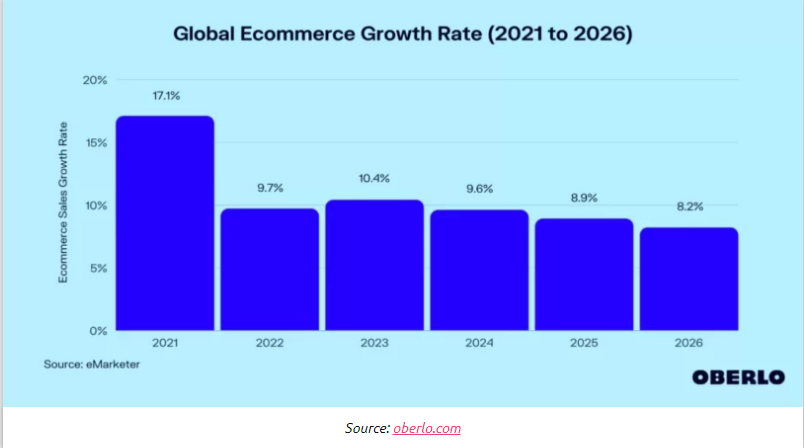Artificial intelligence has recently revolutionized the ecommerce industry, and online sellers feel its effects. AI improves customer experiences and develops innovative solutions such as personalized shopping experiences, voice search, virtual assistance, inventory management, chatbots, and product recommendations.
The ecommerce industry is growing at an extraordinary rate. Global ecommerce growth is expected to reach 10.4% this year, accounting for $6.3 trillion in international sales. Furthermore, online shopping in the United States is anticipated to grow exponentially, from $907.9 billion in 2022 to $1.4 trillion in 2025.
Artificial intelligence (AI) drives current and future developments in this field. E-commerce businesses can achieve unprecedented levels of personalization and efficiency by leveraging the power of AI. This article will explore the top trends that will revolutionize the future of e-commerce.
AI Trends That Will Revolutionize E-Commerce
1. Voice commerce
Voice commerce is a new trend where customers can purchase products or services using their voice. Artificial intelligence-powered virtual assistants like Google Home and Amazon’s Alexa utilize natural language processing to understand customer requests and make personalized recommendations.
2. Artificial intelligence and machine learning
AI and ML enable automated and personalized shopping experiences. AI constantly collects data on how customers shop, make purchases, and what they look for in a product or service. It is a piece of technology that cannot be reproduced in-store.
3. Sustainability
Consumers and businesses are both becoming more conscious of the environment. As a result, consumers are becoming more concerned about where they shop, its environmental impact, and its consequences.
According to one survey, 50% of respondents want more sustainability in the fashion industry, while 75% want less packaging.
Many businesses attempt to be more environmentally conscious by going paperless whenever possible and using biodegradable packaging and recyclable materials.
4. Personalization with omni channel
Omni channel personalization uses AI to customize customer interactions across multiple channels, including email, mobile apps, and social media. Businesses can create a personalized and seamless customer experience by combining data from these channels.
5. Mobile shopping is still on the move
Mobile shopping enables customers to make purchases from anywhere, which is essential in today’s world. However, if your e-commerce site is not mobile-responsive or accessible through web apps, you will miss significant opportunities. Mobile shoppers want the added convenience and the ability to pay digitally.
6. Automated shipping for speedy delivery
When discussing the future of e-commerce, the potential for automated shipping must be addressed. As more customers buy online, the demand for strategically located fulfillment centers to deliver orders in the shortest amount of time has grown significantly.
Automated shipping is undoubtedly one of the most essential future e-commerce trends to keep an eye out for and optimize your store. This eliminates the stressful task of aligning shipments, resulting in faster and more timely deliveries to your customers.
7. Social commerce and shippable content
Social media platforms will be critical in boosting e-commerce sales in 2024. Businesses will leverage the power of social commerce by allowing direct purchases through platforms like Instagram and Facebook. Influencer marketing and user-generated content will remain effective ways of promoting products and engaging customers.
Social commerce will use interactive and immersive shopping experiences, such as augmented reality try-ons and virtual showrooms, to provide customers with engaging and seamless shopping experiences.
8. Blockchain technology in e-commerce
Blockchain technology will continue to shake up the e-commerce industry in 2024. It will ensure that transactions are transparent and secure, building trust between buyers and sellers. E-commerce companies will look into blockchain-based solutions for supply chain transparency, allowing customers to track the origin and authenticity of products. Customers can now buy products directly from other people thanks to blockchain-enabled decentralized marketplaces and peer-to-peer transactions.
9. Visual search and image recognition
Visual search technology is expected to gain traction in 2024, making product discovery more accessible for customers. E-commerce sites that allow users to search for products with images can produce more accurate and relevant search results.
AI-powered image recognition algorithms will increase the accuracy of visual search, permitting customers to find products that match their preferences. This technology will not only improve the user experience but will also boost conversion rates.
10. Streamlined checkout process
In 2024, businesses will prioritize streamlining the checkout process to reduce cart abandonment rates. One-click payments and guest checkout options will become more common, making purchasing more accessible for customers. Progressive web applications (PWAs) will gain popularity, offering app-like experiences through web browsers. Integrating seamless payment gateways and third-party solutions will improve checkout, providing customers a smooth and easy payment experience. Transform your online identity with stellar web design California, where creativity meets innovation to craft visually stunning and highly engaging digital experiences
The future of e-commerce with AI
The future of e-commerce with AI looks bright as technology evolves and improves. Enhancing automation capabilities allows e-commerce businesses to save money while improving the online shopping experience.
The e-commerce industry can improve customer satisfaction and streamline operations by providing online customers with a more seamless shopping experience. As technology advances and evolves, the potential for AI in e-commerce increases exponentially.
Conclusion
Artificial intelligence is important in improving industry efficiency and the shopping experience. Brands’ role in embracing these technologies and incorporating them into their direct-to-consumer strategies will drive growth. AI will soon take over customer service, warehousing, and inventory management applications and create personalized shopping experiences. They use AI and data gathered from online shoppers and businesses. Brands can make more informed decisions by better-leveraging data to forecast future results and adjust marketing strategies accordingly.




4 thoughts on “How AI Will Revolutionize The E-Commerce Future: Top Trends To Know”